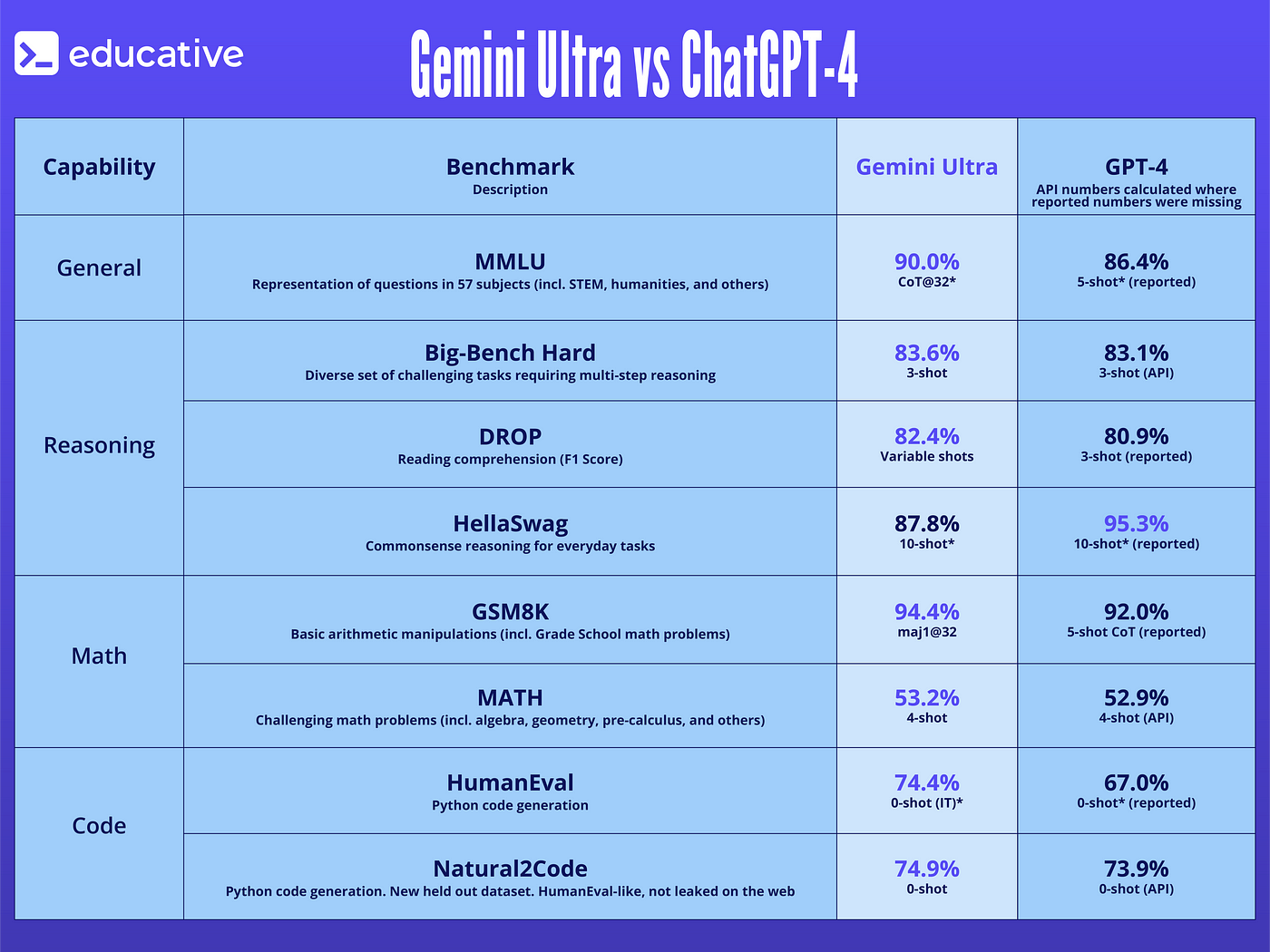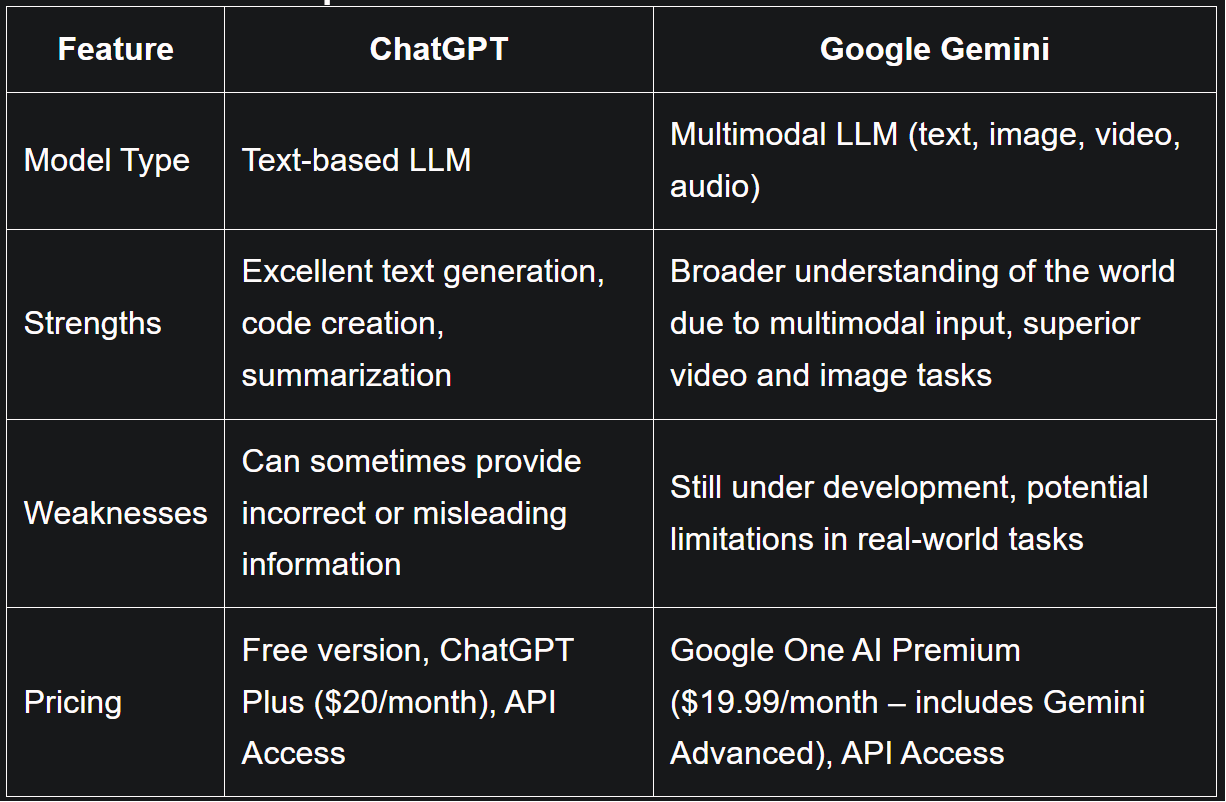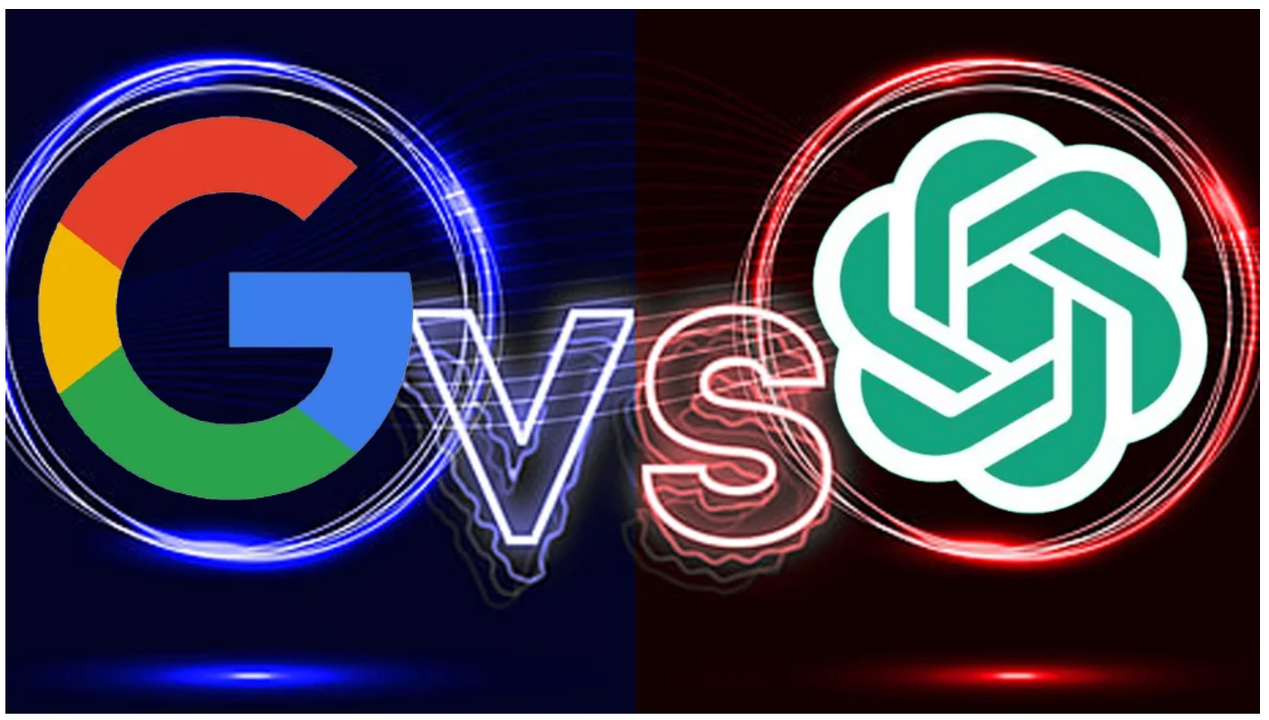The difference between ChatGPT and Google’s Gemini lies in their design: ChatGPT focuses on conversational AI, while Gemini integrates advanced multimodal capabilities, combining text, images, and real-time data processing.
Understanding the differences between ChatGPT and Google’s Gemini can help users choose the right tool. ChatGPT, developed by OpenAI, focuses on generating human-like text based on prompts. It’s popular for conversational AI, content creation, and more. On the other hand, Google’s Gemini is designed to integrate with Google’s ecosystem, offering powerful search and data analysis features.
Comparing these two can be beneficial for individuals and businesses seeking the best AI solution. This guide will explore their key differences, helping you make an informed decision. Dive in to discover which AI tool suits your needs best.
Development Background
Understanding the development history of ChatGPT and Google’s Gemini gives insights into their capabilities. These AI tools have distinct origins and development paths. Let’s explore their backgrounds.
Origins Of Chatgpt
ChatGPT is a product of OpenAI, a research organization founded with the mission of ensuring artificial general intelligence (AGI) benefits all of humanity. The origins of ChatGPT trace back to OpenAI’s advancements in deep learning and natural language processing (NLP). Here’s an overview of its evolution:
1. Foundation of OpenAI (2015)
- OpenAI was founded by Elon Musk, Sam Altman, Greg Brockman, and others to promote safe and beneficial AI.
- Early focus was on developing general AI systems and advancing the field of machine learning.
2. Development of the Transformer Model (2017)
- The Transformer architecture, introduced in the paper “Attention is All You Need” by researchers at Google, revolutionized NLP.
- This architecture became the foundation for large language models (LLMs), enabling them to understand and generate human-like text.
3. Introduction of GPT (Generative Pre-trained Transformer)
- GPT-1 (2018):
OpenAI released the first version of GPT, which demonstrated the potential of unsupervised pre-training on massive text corpora. - GPT-2 (2019):
A larger and more capable model was introduced, with 1.5 billion parameters. OpenAI initially withheld the full version due to concerns about misuse. - GPT-3 (2020):
A groundbreaking version with 175 billion parameters, GPT-3 showcased significantly improved capabilities in generating coherent and contextually relevant text.
4. Release of ChatGPT (2022)
- ChatGPT is a fine-tuned version of GPT-3.5, optimized for conversational applications.
- It was trained with reinforcement learning from human feedback (RLHF), making it better at providing helpful, safe, and user-friendly responses.
- OpenAI made it widely accessible through its web app and APIs, marking its entry into consumer-oriented AI tools.
5. Ongoing Development and GPT-4 (2023)
- GPT-4 was released with enhanced reasoning, better contextual understanding, and multimodal capabilities (text and images).
- ChatGPT evolved into an even more versatile tool, used for creative writing, coding assistance, education, and professional applications.
Impact of ChatGPT
ChatGPT represents a key milestone in AI, showcasing the practical application of LLMs in everyday life. It bridges the gap between technical AI research and accessible, consumer-friendly tools, revolutionizing how people interact with technology.
Origins Of Google’s Gemini
Google’s Gemini is a newer addition to the AI landscape. It is part of Google’s ongoing AI research and development efforts. Google has a history of AI innovations, including Google Assistant and BERT.
The Gemini project aims to enhance human-computer interaction. It builds on Google’s extensive AI expertise and infrastructure. Although details are limited, Gemini focuses on advanced language understanding.
Google’s approach emphasizes integration with its ecosystem. This includes search, cloud services, and other Google products. The goal is a seamless user experience across different platforms.
- Advanced language understanding
- Integration with Google ecosystem
- Focus on user experience
Google’s Gemini is a groundbreaking artificial intelligence model developed by Google DeepMind. It represents Google’s most advanced AI system, specifically designed to integrate and process multiple types of data—text, images, audio, video, and code—through its multimodal capabilities. This design allows Gemini to seamlessly combine and analyze information from various sources, making it highly effective in tasks requiring complex reasoning and understanding.
Gemini was built from the ground up using Google’s specialized AI infrastructure, including advanced Tensor Processing Units (TPUs). The model is available in different configurations—Ultra, Pro, and Nano—catering to varying levels of complexity and device compatibility. For example, Gemini Pro powers an enhanced version of Bard, Google’s conversational AI, while Gemini Nano is optimized for on-device tasks, such as features in the Pixel 8 Pro smartphone.

Credit: learningdaily.dev
Core Technologies
Understanding the core technologies of ChatGPT and Google’s Gemini is crucial. Both AI models are powerful but built on different foundations. This section dives into the underlying technologies of each.
Underlying Technology Of Chatgpt
ChatGPT is developed by OpenAI. It’s based on the GPT-3 architecture. GPT stands for Generative Pre-trained Transformer. This model uses deep learning. It relies on a vast amount of text data. The core mechanism is the Transformer neural network. This network processes text in parallel. It understands context better than older models.
ChatGPT uses unsupervised learning. It learns from large datasets without labeled responses. The model predicts the next word in a sentence. Through this, it generates coherent and context-aware text.
Key features of ChatGPT’s technology include:
- Transformer architecture
- Large-scale unsupervised learning
- Context-aware text generation
Underlying Technology Of Google’s Gemini
Google’s Gemini is based on different principles. It uses multimodal learning. This means it can process and understand both text and images. Gemini leverages the BERT (Bidirectional Encoder Representations from Transformers) model. BERT differs from GPT-3. It reads text in both directions, providing deeper understanding.
Gemini also integrates Google’s vast search data. This enhances its ability to provide relevant information. The model is trained using supervised learning. This means it learns from labeled data, improving accuracy.
Key features of Google’s Gemini technology include:
- Multimodal learning capabilities
- BERT-based architecture
- Integration with Google search data
Key Features
Understanding the key features of ChatGPT and Google’s Gemini helps users choose the best AI tool for their needs. Both platforms offer unique functionalities that set them apart. Let’s explore these differences in detail.
Unique Features Of Chatgpt
ChatGPT is designed to provide human-like text responses. It excels in generating conversational replies that mimic natural language.
- Versatility: ChatGPT can engage in various topics, making it ideal for diverse applications.
- Contextual Understanding: It maintains context over long conversations, enhancing user experience.
- Customization: Developers can fine-tune it for specific tasks and industries.
- Accessibility: Available through multiple platforms like web, mobile, and API integrations.
Unique Features Of Google’s Gemini
Google’s Gemini focuses on leveraging Google’s extensive data resources to provide accurate and insightful responses.
- Data Integration: Gemini integrates seamlessly with Google’s ecosystem, including Search, Maps, and more.
- Advanced AI Algorithms: Uses cutting-edge AI technology for precise information retrieval.
- Real-Time Updates: Benefits from real-time data updates, ensuring up-to-date responses.
- Enhanced Security: Implements robust security measures to protect user data.
Both ChatGPT and Google’s Gemini offer distinctive features that cater to different user requirements. Whether you need versatile conversational AI or data-driven insights, understanding these key features can guide your choice.
Use Cases
Understanding the differences in use cases between ChatGPT and Google’s Gemini
can help you choose the right tool for your needs. These AI models serve
different purposes and excel in various applications. Here, we explore their
unique applications.
Applications Of Chatgpt
ChatGPT is versatile and can be used in many ways. Here are some common
applications:
- Customer Support: ChatGPT can handle common customer queries,
saving time for human agents. - Content Creation: It helps generate blog posts, articles, and
other written content quickly. - Education: Students can use it to get explanations on various
topics or practice languages. - Entertainment: ChatGPT can create stories, jokes, and other
creative content for fun. - Personal Assistant: It can set reminders, answer questions,
and help manage schedules.
Applications Of Google’s Gemini
Google’s Gemini is designed with unique capabilities. Here are some of its
primary applications:
- Data Analysis: Gemini excels in processing large datasets and
providing insights. - Search Enhancements: It improves search engine results by
understanding context better. - Healthcare: Gemini assists in diagnosing diseases and
suggesting treatments based on data. - Business Intelligence: It helps businesses make data-driven
decisions by analyzing market trends. - Natural Language Understanding: Gemini can interpret and
respond to complex queries more accurately.
Performance Comparison
When comparing ChatGPT and Google’s Gemini, performance is a key factor. This section will explore how these two AI models measure up in terms of accuracy and reliability as well as speed and efficiency.
Accuracy And Reliability
Accuracy and reliability are crucial for any AI model. ChatGPT excels in generating human-like text. It uses a large dataset to ensure high accuracy. However, it occasionally produces incorrect or nonsensical answers.
Google’s Gemini focuses on understanding context. This makes it more reliable in delivering accurate responses. It uses advanced algorithms to minimize errors and improve consistency. Let’s look at a table for a clear comparison:
| Feature | ChatGPT | Google’s Gemini |
|---|---|---|
| Accuracy | High, but sometimes errors | Very High |
| Context Understanding | Good | Excellent |
| Consistency | Moderate | High |
Speed And Efficiency
Speed and efficiency are essential for user satisfaction. ChatGPT responds quickly, making it efficient for real-time interactions. It uses optimized algorithms to reduce response time.
Google’s Gemini also prioritizes speed. It leverages Google’s powerful infrastructure. This ensures rapid processing and delivery of responses. Efficiency is enhanced through advanced machine learning techniques. Here’s a detailed comparison:
| Feature | ChatGPT | Google’s Gemini |
|---|---|---|
| Response Time | Fast | Very Fast |
| Processing Efficiency | High | Very High |
| Infrastructure | Optimized | Highly Optimized |
User Experience
Understanding the user experience is key when comparing ChatGPT and Google’s Gemini. Both platforms offer unique features and benefits. Let’s explore how they differ in ease of use and user interface design.
Ease Of Use
ChatGPT and Google’s Gemini both aim to provide a smooth user experience. Yet, they approach it differently.
- ChatGPT: Known for its straightforward setup. Users can start chatting almost immediately. No need for extensive tutorials or guides.
- Google’s Gemini: Offers a bit more complexity. Users might need to navigate through initial settings. Familiarity with Google’s ecosystem can be beneficial.
Both platforms prioritize user convenience but in distinct ways. ChatGPT excels in simplicity. Gemini provides more options for customization.
User Interface Design
The user interface design plays a crucial role in user experience. Let’s compare the designs of ChatGPT and Gemini.
| Feature | ChatGPT | Google’s Gemini |
|---|---|---|
| Layout | Minimalistic, clean | Comprehensive, detailed |
| Navigation | Simple, intuitive | Multi-layered, feature-rich |
| Customization | Basic customization options | Advanced customization available |
ChatGPT has a minimalistic design. This ensures users focus on the conversation. Google’s Gemini, on the other hand, offers a more detailed interface. It caters to users seeking advanced features and customization.
Both designs have their own merits. ChatGPT attracts users who want a clean and straightforward experience. Gemini appeals to those who enjoy exploring more features and settings.
Future Prospects
As we look towards the future, both ChatGPT and Google’s Gemini have promising developments on the horizon. These advancements aim to enhance their capabilities and broaden their applications in various fields. Let’s explore what the future holds for these two AI giants.
Planned Developments For Chatgpt
OpenAI continues to invest heavily in the growth of ChatGPT. Their focus is on improving the model’s accuracy and contextual understanding. This will make interactions more natural and relevant.
- Enhanced Contextual Awareness: Future versions will better remember past interactions. This will ensure more coherent and relevant conversations.
- Increased Multimodal Capabilities: ChatGPT will soon understand and generate text, images, and possibly even videos.
- Broader Language Support: Plans to support more languages are underway, making ChatGPT accessible to a global audience.
- Improved Safety Measures: Efforts to reduce biases and harmful outputs are ongoing. This will create a safer user experience.
Planned Developments For Google’s Gemini
Google’s Gemini is also set for significant advancements. The focus is on integrating the AI deeply with Google’s ecosystem, leveraging its extensive data resources.
- Seamless Integration: Gemini will integrate more smoothly with Google services like Search, Maps, and Assistant.
- Enhanced Personalization: Using Google’s data, Gemini will offer more personalized and context-aware responses.
- Advanced Multimodal Processing: Plans include understanding and generating content across multiple formats. This includes text, images, and videos.
- Stronger Privacy Controls: Google is focusing on robust privacy measures. This ensures user data is protected while using Gemini.

Credit: ashamaei.medium.com
Frequently Asked Questions
What Is Chatgpt?
ChatGPT is an advanced AI language model developed by OpenAI. It specializes in generating human-like text based on input. It is widely used for chatbots, content creation, and more.
What Is Google’s Gemini?
Google’s Gemini is an AI language model created by Google. It focuses on natural language understanding and generation. It competes with models like OpenAI’s ChatGPT.
How Do Chatgpt And Gemini Differ?
ChatGPT and Gemini differ in their development sources and specific use cases. ChatGPT is by OpenAI, while Gemini is by Google. Both have unique strengths in language processing.
Which Is Better: Chatgpt Or Gemini?
Determining which is better depends on specific use cases. ChatGPT excels in conversational tasks. Gemini may offer better integration with Google services.
Conclusion
ChatGPT and Google’s Gemini serve different needs. ChatGPT excels in conversational tasks. It helps with customer support and personal chats. Google’s Gemini focuses on search and data analysis. It is great for finding information quickly. Choosing between them depends on your specific requirements.
Both tools have unique strengths. Understanding these differences can guide your decision. Use the right tool for the right job. This will ensure better results and satisfaction.

